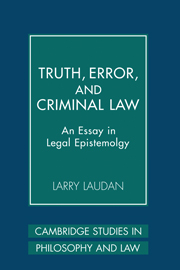Book contents
- Frontmatter
- Contents
- Preface
- Abbreviations and Acronyms Used
- 1 Thinking about Error in the Law
- PART I THE DISTRIBUTION OF ERROR
- 2 The Unraveling of Reasonable Doubt
- 3 Fixing the Standard of Proof
- 4 Innocence, the Burden of Proof, and the Puzzle of Affirmative Defenses
- PART II FLAWED RULES OF EVIDENCE AND PROCEDURE
- Index
3 - Fixing the Standard of Proof
Published online by Cambridge University Press: 05 June 2012
- Frontmatter
- Contents
- Preface
- Abbreviations and Acronyms Used
- 1 Thinking about Error in the Law
- PART I THE DISTRIBUTION OF ERROR
- 2 The Unraveling of Reasonable Doubt
- 3 Fixing the Standard of Proof
- 4 Innocence, the Burden of Proof, and the Puzzle of Affirmative Defenses
- PART II FLAWED RULES OF EVIDENCE AND PROCEDURE
- Index
Summary
‘Tis much more Prudence to acquit two Persons, tho’ actually guilty, than to pass Sentence of Condemnation on one that is virtuous and innocent.
– Voltaire (1749)It is better that five guilty persons should escape punishment than one person should die.
– Matthew Hale (1678)It is better that ten guilty persons escape [punishment] than that one innocent suffer.
– William Blackstone (eighteenth century)I should, indeed, prefer twenty guilty men to escape death through mercy, than one innocent to be condemned unjustly.
– John Fortesque (1471)It is better a hundred guilty persons should escape than one innocent person should suffer.
– Benjamin Franklin (1785)It is better … to acquit a thousand guilty persons than to put a single innocent man to death.
– Moses Maimonides (twelfth century)The standard of proof (hereinafter, SoP) in criminal trials in the United States is, I have just claimed, a mess. It is not only ill defined, but it smacks of the arbitrary. Why, one is moved to ask, should it be set at the level of BARD – assuming we knew where that was – rather than still higher or much lower? As we saw in the last chapter, the Supreme Court said in Winship that due process requires BARD, nothing more and nothing less. That is daft. What due process (understood as fairness and the right not to be subjected to capricious or unreasonable demands or restrictions) implies is that the same SoP – whatever it may be – be brought to bear in all similar cases.
- Type
- Chapter
- Information
- Truth, Error, and Criminal LawAn Essay in Legal Epistemology, pp. 63 - 88Publisher: Cambridge University PressPrint publication year: 2006



